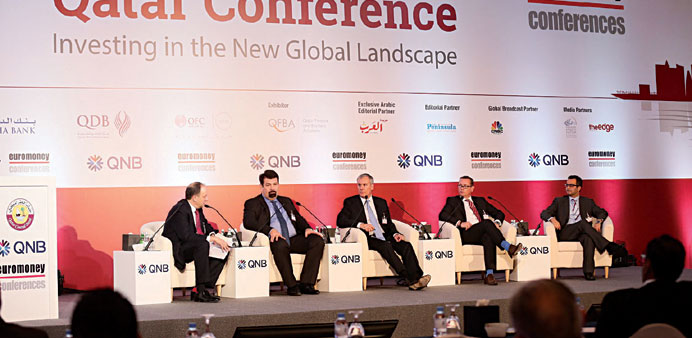By Santhosh V Perumal/Business Reporter
The gas market is likely to begin to recover in 2016, which is “positive” for Qatar and other energy producers in the Gulf Co-operation Council (GCC) in the long term, experts told Euromoney Qatar Conference.
In the ‘Energy Strategy’ session, the panel expressed optimism in the gas market as nations around the world look to reduce emissions and introduce cleaner energy sources.
Gas demand globally has grown at a better rate than oil in recent years – averaging 2.5% – and is likely to increase as more nations look to phase out coal and other “dirty” fossil fuels, said the panel consisting of Sabri Asfour, general manager FAS Energy; John Butler, president and head of wealth services, GoldMoney; Tim Guinness, founder and chief investment officer of Guinness Asset Management and Jonathan Osborne, finance director of Qatar Shell.
As a result, the longer-term picture is positive for nations like Qatar and other energy producers in the GCC, given their long-term investments in the sector and their status as low-cost producers, the panel told the conference, which concluded yesterday.
With global demand expected to remain weak in the first half of next year, senior executives from leading asset managers and energy companies agreed that the disruption of the last 15 months is likely to continue.
The energy panel found that oil supply is continuing to fall, as less economically-viable projects are postponed and cancelled.
In this regard, the experts cited that the US rig count declined to the lowest level since 1999 in December, with 737 rigs engaged in exploration and production – less than half the 2014 level of 1,920.
Given the current dip on the supply-side, analysts expect demand will outstrip supply as early as April 2016, leading to a recovery in oil prices.
Recently, Saudi Aramco chief executive Amin H al-Nasser had told the recently concluded International Petroleum Technology Conference that with additional supplies drying up, the current demand supply imbalance will “stablise”, which will see a concomitant “adjustment” in prices by 2016.
The energy session focused on falling demand from industrial powerhouses around the world, such as the Brics (Brazil, Russia, India, China and South Africa), which has driven oil prices down in 2015.
On the “Technology and Finance” panel, senior executives from Hive Technology, FinTechStage, QNB and Visa outlined some of the innovations that are impacting the financial sector, as well as the challenges preventing institutions from fully realising the benefits of these technologies.
“Technology risk is very prevalent today. Organisations need to recognise that new technologies can provide tools to mitigate risks – by identifying fraud attempts and verifying identities more accurately – and also that these technologies themselves can generate new risks,” according to Duncan Fairley, Head of Group Operational Risk, QNB.
He said the next generation of cyber-threats – which include identity theft, ‘spoofing’ and theft of assets online – will require a new skill set and operational model by banks and financial institutions.
Lazaro Campos, co-founder, FinTechStage, said the move towards a cashless society is taking place, and we will need central banks, financial services companies and technology leaders to work together in order to stay ahead of the pace of change.
One area that is likely to generate significant disruption is the move towards mobile and online payments, and the wider social shift to a “cashless society”. In the GCC region, where 90% of retail transactions are still conducted in cash, the adoption of more cashless payment channels is likely to have a transformative effect.

A panel on Technology and Finance at the Euromoney Conference.
